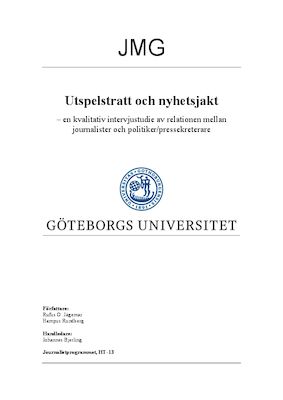Utspelstratt och nyhetsjakt
en kvalitativ intervjustudie av relationen mellan journalister och politiker/pressekreterare
In this study we have explored and investigated how journalist experience the relationship with politicians/press secretaries in the making of political news. The study examines how journalists see the balance of power between them and their political sources in the setting of the news agenda. To do this we have used a qualitative interview analysis. Our theoretical starting points have been based on the social exchange model. The social exchange model has a social psychological and sociological perspective that explains the interaction, social exchange and stability as a process of negotiation exchanges between parties and operators. Social exchange theory posits that human relationship and interaction are formed by the use of a subjective cost-benefit analysis and the comparison of alternatives. On the other hand this model only describes the exchange as rational. To really understand the exchange and power of balance between the parties we had to incorporate factors and theoretical standing points regarding norms, ideal, cultures and organizational structures in our analysis and study. We also had to incorporate the changing strategies of the political actors and how those strategies influence the journalist’s in their daily work. The last factors of analysis we used are based on the changing of the journalistic content and the emergence of analysis and commentating as journalistic tools. Our outset has been that the relationship between politicians/press secretaries and journalist are symbiotic and that the power of balance is changing. We used four themes of analysis to analyze the journalist’s experience of their relationship with politicians/press secretaries in the setting of the news agenda:
1. The exchange between the parties (exchange model)
2. Ideals, norms and internal and external structures/conditions
3. The professionalization of politics and actions of the political secretaries
4. The ever §changing future of political journalism and the emergence of new media channels and analysis and commentating the content of journalism.
The results have shown that politicians and press secretaries have the ability and will to influence the journalists in their daily work and that the journalist work actively to counter this influence in their quest for an objective, impartial and independent journalism. The result has also shown that the actions of influence have increased, and that the different strategies to influence the news agenda have changed. The results have also shown that the journalists don’t believe that the relationship is about giving and taking, and that they have the power over the news agenda. The journalists believe that they gain more in the exchange with the politicians and press secretaries, and that the politicians and press secretaries have to adjust to the conditions set by the journalists. Something that is questionable. We have also found that the internal and external conditions (editorial, economy and technology) are influencing the journalism and the political sphere in a way that may shift the power of balance between the parties.

